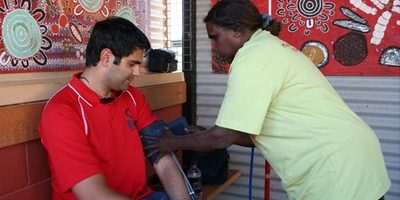
New grant to help fix Australia’s blood pressure problem
A team of George Institute researchers, in collaboration with experts across the country, have been awarded almost $1m by the NSW Office for Health and Medical Research as part of the Cardiovascular Collaborative Grants program to look at new ways to transform blood pressure control.
One-third of Australian adults have raised blood pressure, or hypertension, and it is the leading cause of preventable death. Around half of those with hypertension are unaware of their condition and only a third have their blood pressure controlled with medication.
Chief Investigator Professor Alta Schutte explained that it is not a new problem, but it persists despite the ease of diagnosis, understanding of underlying causes, and the wide availability of effective medications for the condition.
“Our program of work aims to identify why current approaches to implementing multiple proven hypertension control strategies are not working in Australia,” she said.
Following on from the recently published call-to-action to improve blood pressure control in Australia, the National Hypertension Taskforce was launched by Minister Butler on December 8, 2022, with the goal of increasing control rates from 32% to 70% by 2030.
To achieve this ambitious target, the investigator team – who also lead the Hypertension Taskforce – has developed four collaborative research themes, each addressing a proven and high-potential opportunity to reduce blood pressure, that will be led by internationally recognised Australian leaders and multi-institutional, multidisciplinary teams.
1. Innovative approaches to community awareness and diagnosis
Screening sites will be located in-store at a popular retail chain and automated blood pressure devices will be used to identify people with raised blood pressure, who will then be encouraged to see their doctor for diagnosis and prescription of blood pressure lowering medication.
2. Switching Australia’s salt supply from regular salt to potassium-enriched salt
An experienced team of dieticians, lawyers, business analysts, and health economists as well as epidemiologists and clinicians will identify opportunities and barriers to the scale-up of potassium-enriched salt use in Australia.
3. Simplified treatment: Towards evidence-based prescribing in primary care
Major international guidelines now recommend single pill combinations (SPCs) as first-line therapy - this theme will support GP prescribing of SPCs through a simplified strategy and education on international best practice in blood pressure treatment.
4. Optimised monitoring using digital health tools
A team with high-level experience in digital tools, will evaluate the potential of mobile health strategies optimised with artificial intelligence, incorporating health monitoring data, to help motivate patients to keep up with their treatments and maintain the necessary lifestyle behaviours for better blood pressure control.
“Through this initial work we hope to establish a national blueprint for the successful management of hypertension to bring the nation’s blood pressure back under control and prevent numerous deaths from heart attacks, strokes, kidney disease and dementia,” Prof Schutte









